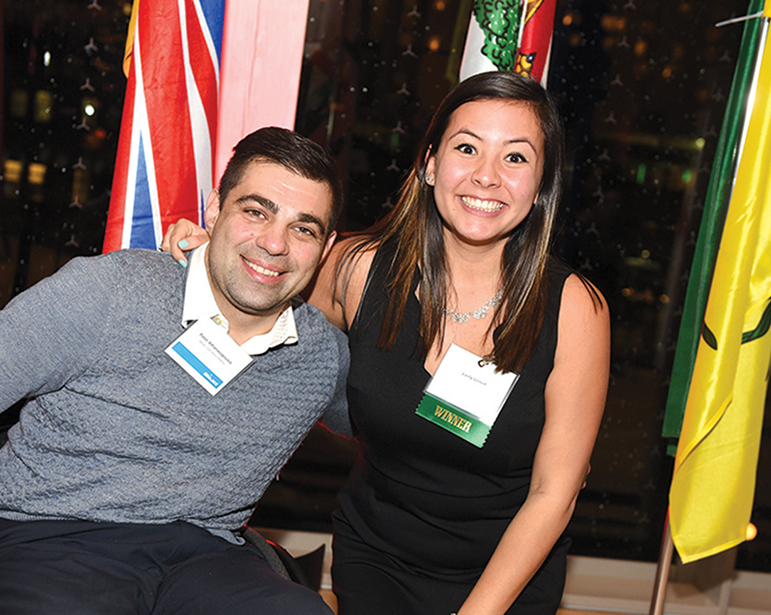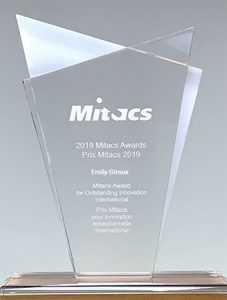Spinal Cord Injury Ontario engages in exactly this kind of research. Advancing the science of spinal cord injury requires partnerships between researchers, clinicians, experts and those living with SCI to ensure that research questions, studies and outcomes are accurate and useful. Through partnership and co-developed studies, knowledge that changes lives can be generated, shared and used to guide public policy.
“Good research produces good policy change,” says Peter Athanasopoulos, Director of Advocacy at SCIO. “System change needs evidence from research partnerships to support our recommendations. Knowledge truly is power.”
SCIO’s largest provincial research partner is the Ontario Neurotrauma Foundation (ONF) and largest federal partner is the Praxis Spinal Cord Institute (formerly the Rick Hansen Institute). With the greatest access to people with SCI across Ontario, SCIO is invaluable for its reach, expertise and knowledge of how to engage people with lived experience in research. That model of engagement is collaborative throughout, from asking the right research question at the outset through the study design, inclusion of people with SCI on the research team, and use of SCI networks to disseminate findings.
In addition, the Ontario SCI Alliance, co-led by SCIO and ONF, brings together over 250 participating members of researchers, service providers, clinicians, policy makers, funders and people living with SCI to share knowledge and translate research to practice. The Alliance supports people with SCI from injury through to full community reintegration and participation.
“When it comes to research, we say, ‘engage early, engage often,’” Peter explains. “The best way to ensure relevance and real-world impact is to develop research with the SCI community. We do that by inviting members of our community to participate in projects, which is both personally rewarding and scientifically significant.”
Peter speaks from experience. Following his spinal cord injury, his bone density was decreasing year after year. Eventually, he was diagnosed with osteoporosis, with a high risk of fractures, at the age of 18.
“The medication I was using wasn’t helping,” Peter explains. “So I involved myself in research studies, both pharmacological and other interventions. I slowly started rebuilding my bone density, stabilized bone loss, and improved my health. The value of research isn’t abstract. Becoming involved can directly help you, someone you know, and the wider community.”
Setting the right research priorities as an organization is key to supporting that community. SCIO’s four research objectives encompass the kind of personal experience Peter describes while also reaching beyond individual participation to systemic gaps:
1
Improve the knowledge base of primary care teams for the SCI population.
2
Scale best practice across all dedicated SCI rehab centres.
3
Apply best practices in the community for people living and aging with SCI, particularly in support of Ontario Health Teams.
4
Prevent unnecessary secondary complications across the care continuum.
To help meet those priorities and support community members directly with relevant information, SCIO developed the Cortree Disability Education Centre, a social enterprise that provides relevant education for people with disabilities and their families. Initially reaching out to the community to understand which topics were of greatest interest, SCIO then developed dynamic, interactive courses on the greatest hits: choosing a wheelchair, pain management, sexual health, nutrition and kitchen accessibility, and vehicle modification. Cortree is a powerful way to support independent living by offering courses informed by the expertise of researchers, health care professionals, industry experts and disability specialists. (Learn more at sciontario.org/cortree )

SCIO also invites externally-funded researchers to join its team when the opportunity arises, as it did when UBC Master’s of Science student Emily Giroux spent a four-month internship co-developing a method for the SCI community to find consensus about its needs and priorities. Funded by a MITACS Accelerate Grant, which provides work experience in a student’s area of expertise, Emily helped devise a large-scale, community-based survey tool for decision-making in the SCI population.
 “We sent the survey to over 2,500 members of the SCI community and the response rate was fantastic,” says Emily. “Close to 75% of responses came from people with lived experience of SCI. I then presented the results at an Alliance meeting. It was really exciting to see research being put into practice.”
“We sent the survey to over 2,500 members of the SCI community and the response rate was fantastic,” says Emily. “Close to 75% of responses came from people with lived experience of SCI. I then presented the results at an Alliance meeting. It was really exciting to see research being put into practice.”
This work also happened to win Emily the Mitacs Award for Outstanding Innovation — Master’s in 2019.
What was Emily’s greatest takeaway from her time as an intern? “The importance of lived experience when it comes to decision-making. Throughout the entire project, people with SCI provided unique insights that could not possibly be predicted.”
Peter agrees that people with SCI belong at the heart of research studies, from inception all the way to interpreting and sharing the results. “That’s why partnership is our research paradigm,” he says. “Combining multiple experiences, perspectives and areas of expertise is our chosen path toward creating and maintaining best practices so our community can enjoy full, independent lives.”
Check out SCIO’s fellowship program at Toronto Rehab, powered by our community donors.






